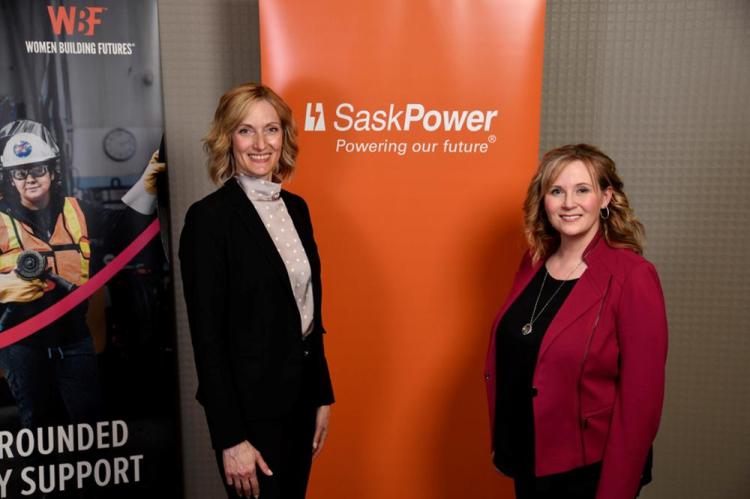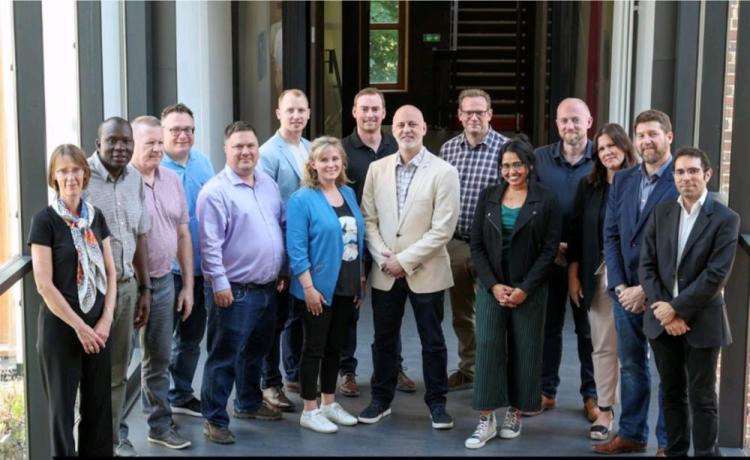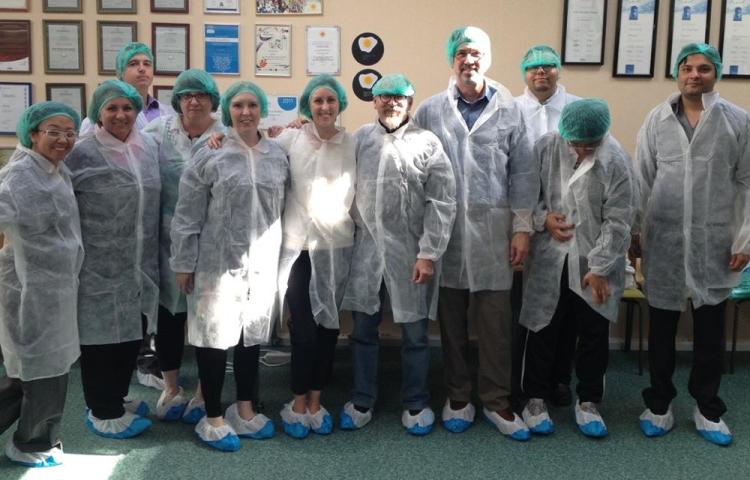Juggling a demanding workload along with family obligations can make it challenging for professionals who want to pursue an advanced degree and transform their careers. For Kathryn Pollack and Rhea Brown, both Executive Vice-Presidents with the crown utility responsible for providing electricity to Saskatchewan, the decision to pursue an executive education required careful consideration, family support, and courage, but they both say it was 100 per cent worth it.
I worked so hard and made sacrifices, but I learned how resilient I am and how much I have to give. I have no regrets. I am so much braver than before I did my EMBA. It was an incredible experience.
Rhea Brown, Executive Vice-President, Customer Experience & Procurement at SaskPower
Kathryn Pollack, Executive Vice-President, People, Safety and Indigenous and Corporate Relations at SaskPower
According to Pollack, the Executive Master of Business Administration (EMBA) program at the University of Regina's Kenneth Levene Graduate School of Business helped her better understand the spectrum of core business functions HR, finance, operations, marketing, and IT then successfully launched her executive leadership journey.
"Getting my EMBA was definitely the catapult for me moving into an executive-level position. To be an executive, you really need to be a generalist in business and understand all parts of the organization, not just the functional areas you are leading," offers Pollack, who graduated from Levene in 2017.
Prior to obtaining her EMBA, Pollack held mid-management positions and aspired to take on an executive role. She says she knew it would take investment in her professional development before she would get an opportunity to take on greater levels of responsibility and influence. She was right. Soon after completing the program, Pollack moved into her first executive role and has never looked back.
Her impressive résumé includes roles such as Chairperson and CEO of the Public Service Commission of Saskatchewan, Chief Procurement Officer for the Ministry of SaskBuilds and Procurement, and Chief Strategy Officer with Praxis Consulting. In her current role at SaskPower, she likes to think big, decipher high-level information from across the organization to gather insights, and develop strategies that lead to action, all while guiding a team of around 200 employees. She credits her EMBA experience for helping her lead with confidence and live her passion.
VP Executives, Kathryn Pollack and Rhea Brown, apply their EMBA knowledge on the job at SaskPower.Credit: Courtesy of SaskPower
"I have so many good things to say about the program, the professors, and course content. I use the tools and strategies from my EMBA every single day in my executive role. I was exposed to so many great people, business approaches, and areas of research that have helped me be successful leading changes both small and big, as well as seeing opportunities that I would not have been able to see before."

Rhea Brown, Executive Vice-President, Customer Experience & Procurement at SaskPower
Brown is nearing the end of her EMBA journey and will proudly walk across the stage and convocate this June with her two young daughters watching.
"I am so looking forward to seeing all of the friends I made in the cohort walk across the stage together and celebrate this achievement," she says.
For Brown, modeling hard work, respect for education, and pursuit of her goals for her children, was as important as gaining the credentials.
"I worked so hard and made sacrifices, but I learned how resilient I am and how much I have to give. I have no regrets. I am so much braver than before I did my EMBA. It was an incredible experience."
Brown has an undergrad degree in Commerce and worked in Vancouver and Toronto before settling in Regina and working at SaskPower. Just a few months after starting her EMBA, she was promoted to executive-level, which made her feel a little overwhelmed with such a full plate but more motivated than ever. As an executive VP, she now leads a team of over 300 people that oversees a broad external customer, supplier, and stakeholder group and is the sponsor for two important employee resource groups: the Culture group and the Pride group. She also volunteers as a Board member for the Regina Immigrant Women's Centre.
"As a leader, I feel a huge responsibility to make a greater impact. Through my EMBA, I learned to be a proud advocate and speak up more. I feel I can make a positive difference in advancing sustainability from many angles, including economic reconciliation and DE&I, and I look forward to having a bigger impact," shares Brown.
A curated MBA experience
The Levene EMBA gives working professionals like Pollack and Brown a set pathway to expanded opportunities and a valued credential in just 18 months. It is designed for business owners and working professionals who want to move up within private, not-for-profit or government organizations.
Pollack describes the EMBA as a "curated experience" and says all of the the right business lessons come together at the right time to create a flow of learning.
"The way you move through the courses and content is designed so that you naturally evolve your executive skills and build confidence. I loved all of the courses, but if I had to pick favourites, I would pick EMBA 865 - Strategy and EMBA 825 - Change Management."
Dwight Heinrichs, the marketing instructor for both the Levene MBA and EMBA programs, wholeheartedly agrees. He has been with the program for more than 15 years and is an expert on branding and innovation.
"There is a focus on systems thinking, critical thinking, and creativity embedded across the EMBA. Classes are planned out as a solid, well-built, and cohesive system. Our students dive very deeply into data, research, and different business models and come out ready to address the problems and opportunities that keep leaders up at night," explains Heinrichs.
The EMBA consists of a four-day weekend workshop, two one-week courses, twelve course modules, and the capstone project, all culminating in the International Study Tour.
Experiential learning overseas
A unique component to the Levene EMBA is the mandatory 7-to-14-day international study tour which is included in the cost of tuition. The cohort travels abroad to a country where they meet with business leaders, learn alongside other business students, and take on the roles of Business Consultants. Past study tours saw learning take place in countries such as Germany, Estonia, Finland, Latvia, France, China, and Brazil.
Brown's cohort traveled to Paris and Lille, France in June 2023 and were partnered with start-ups from various industries. Her working group met with the CEO of a culinary e-commerce company to learn about their business model and main business challenge. A week later, Brown's group presented a strategy to address the business challenge based on what they had learned about data insight, innovation, and marketing in their EMBA to the CEO.

EMBA cohort share sense of relief and joy after completing their business presentations to start-up companies in Lille, France in June 2023. Soon-to-be graduate, Rhea Brown, is standing left of center in the blue sweater. Credit: Kenneth Levene Graduate School of Business
"We designed a whole new pricing strategy and infographics that the company could take and start using right away to showcase their unique value proposition. We barely slept the night before and worked late in the hotel lobby for many nights, but it was so worth it. The CEO had the best reaction after we presented. He said he did not know what to expect and ended up being blown away."
Cohort enhances learning and networking
The EMBA is an intensive cohort-based program which means professionals complete the entire 18 months of study with the same group of people. They develop long-lasting relationships and often reconnect at business and networking events. Both Pollack and Brown agree that being part of a cohort with professionals from different backgrounds, companies, and industries was vital to their learning. The cohort component was one of the reasons Pollack chose Levene.
"When I did my research, the Levene EMBA stood out because of the cohort learning, concise timeline, and quality reputation. It ended up exceeding my expectations and led to significant career changes for all of us. I think everyone either moved up at their current workplace, to a new organization or to a completely different industry," she says.

Executives from the 2015 EMBA cohort at the Kalev Chocolate Factory in Maardu, Estonia. Dwight Heinrichs, Marketing Instructor, is in the centre with beard and glasses. Credit: Kenneth Levene Graduate School of Business
For Brown, her appreciation of cohort learning grew as she moved through the program.
"We started as strangers then by mid-way we were more like a team and helped each other through. I honestly did not expect to learn so much from my peers. We all had something to share and it was eye-opening," reflects Brown.
What are you waiting for?
The EMBA program has an intake once every two years with the next program starting in late August 2024. The deadline to apply is May 15.
"We help executives be successful and dynamic in a world that is constantly changing. They learn to see the big picture across all functions of a business or organization so they can spot opportunities, work collaboratively, help elevate others, and drive creative solutions," explains Heinrichs.
The majority of EMBA students work full-time while completing the program.
"I don't think there's a perfect time to do a master's degree. You just have to decide you're going to do it, then commit 100 per cent," offers Pollack.
Want to advance your career with essential executive and leadership skills? Find out if the Levene EMBA is the right fit for you.
About the University of Regina
2024 marks our 50th anniversary as an independent University (although our roots as Regina College date back more than a century!). As we celebrate our past, we work towards a future that is as limitless as the prairie horizon. We support the health and well-being of our 16,700 students and provide them with hands-on learning opportunities to develop career-ready graduates. Our research enterprise has grown to include 21 research centres and 12 Canada Research Chairs and brings in more than $51.2 million in funding annually. Our campuses are on Treaties 4 and 6 - the territories of the nêhiyawak, Anihšināpēk, Dakota, Lakota, and Nakoda peoples, and the homeland of the Michif/Métis nation. We seek to grow our relationships with Indigenous communities to build a more inclusive future.
Let's go far, together.













